Deciding to welcome a rabbit into your home is a significant step that can lead to years of joy and companionship. With their playful antics and gentle nature, rabbits can bring a unique energy to your household. However, owning a rabbit also comes with its own set of responsibilities and considerations. So, is a rabbit the right pet for you? Are you prepared to meet their specific needs and understand their behavior? It’s essential to assess your living situation, lifestyle, and commitment level before making this decision.
Is a Rabbit the Right Pet for You? Questions to Ask Yourself Before Bringing a Bunny Home

Are you thinking about getting a pet rabbit? They’re cute and cuddly, but owning one is a big choice. Before you bring a bunny home, it’s smart to ask yourself some key questions. Rabbits need special care, space, and time from their owners. Looking closely at what rabbit ownership means can help you decide if it’s right for you. Let’s review some important things to consider before you get a rabbit as a pet.
In this article, we’ll explore crucial questions to help you determine if a rabbit is the right pet. From understanding their dietary requirements to evaluating your available space and time, each aspect is vital in ensuring a harmonious relationship with your future furry friend. By the end, you’ll see whether this delightful creature fits into your lifestyle and family dynamic. Let’s hop into it!
Key Highlights
- Before bringing a rabbit home, evaluate your living space. Ensure you have enough room for a spacious enclosure and a safe area for daily exercise. A proper setup not only keeps your bunny healthy but also provides them with the freedom to explore and play.
- Rabbits require daily attention, exercise, and social interaction. Plan to dedicate at least an hour daily to feeding, cleaning, and bonding time. Consider your lifestyle and availability to ensure you can meet your rabbit’s needs for companionship and care.
- Owning a rabbit comes with various costs, including food, supplies, and veterinary care. Budget for initial setup and ongoing expenses to ensure you can provide for your pet’s needs throughout its life, which can exceed ten years.
1. Consider Your Space
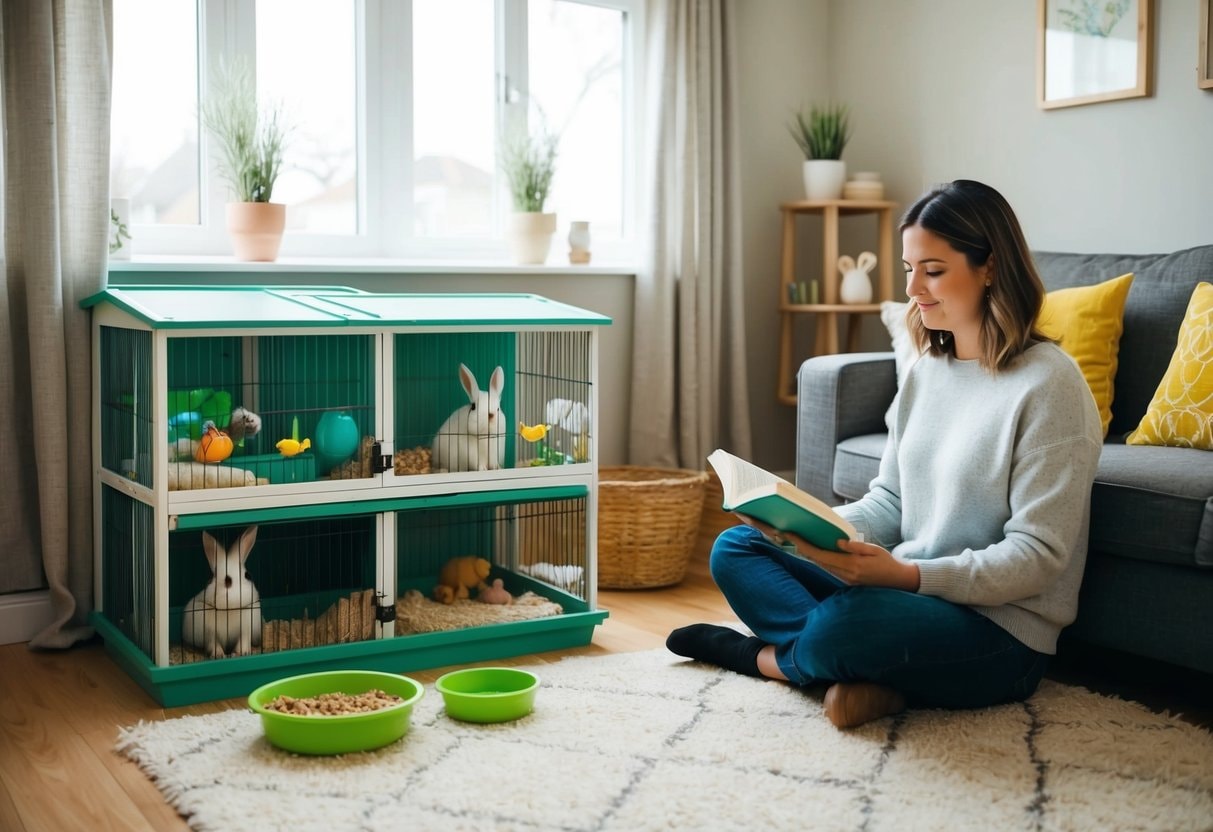
Before getting a rabbit, think about your living space. Is a rabbit the right pet for you? Do you have enough room for a bunny to hop around and explore? Rabbits need a good-sized area to live in; they can’t be kept in small cages all day. A rabbit’s home should be at least four times their size when fully stretched out. You’ll also need space for their food, water, litter box, and toys. Fortunately, rabbits can be trained to use a litter box, which makes cleaning easier.
Do you have a safe place for your rabbit to exercise? They need time outside their enclosure every day to run and play. Can you rabbit-proof a room or area of your home? Bunnies like to chew, so you’ll need to protect wires, furniture, and other items. Is your home too hot or cold? Rabbits do best in temperatures between 60-70°F (15-21°C).
Ask Yourself:
- Do I have enough space for a rabbit enclosure?
- Is there a safe area for my rabbit to exercise?
- Can I rabbit-proof part of my home?
- Is my home’s temperature right for a rabbit?
Your answers will help you decide if your space is ready for a furry hopping friend.
2. Activity Level Requirement
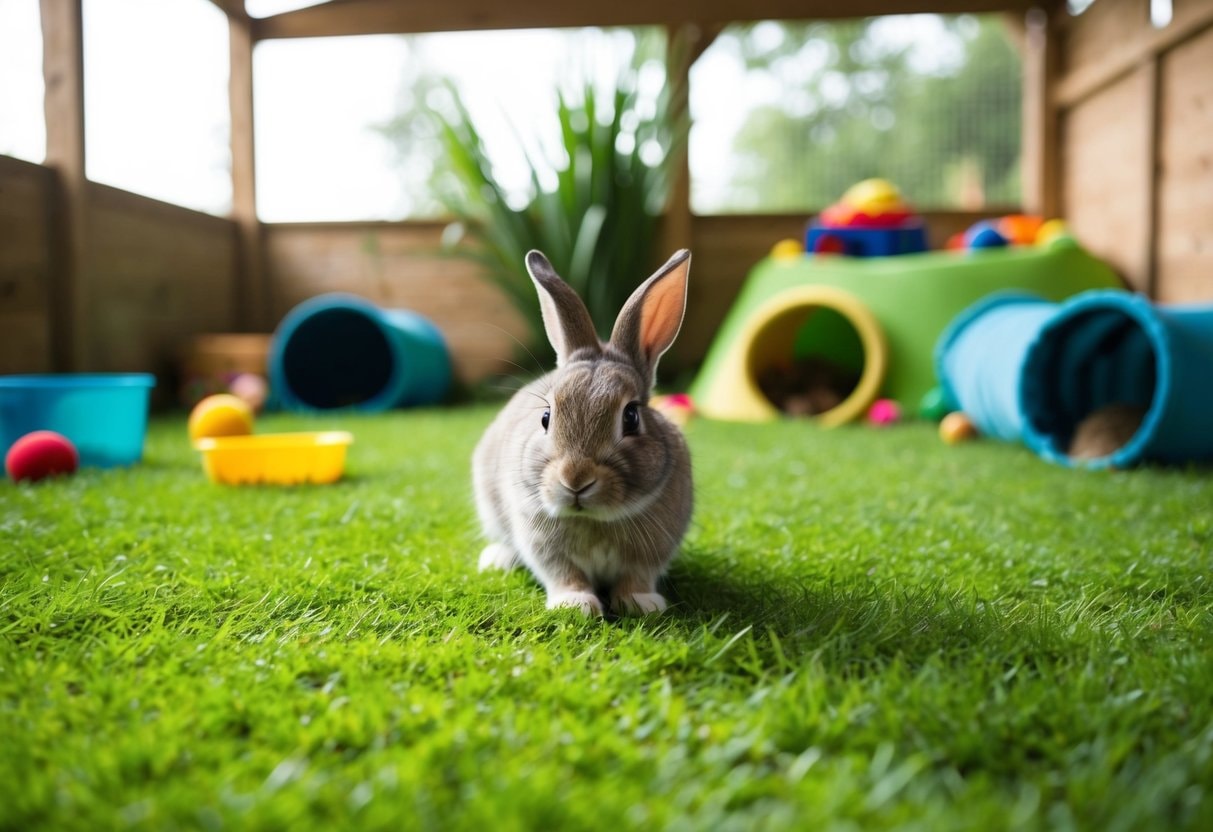
Rabbits need a lot of exercise to stay happy and healthy. Pet rabbits require at least two to three hours of exercise daily, which brings us to the question: Is a Rabbit the Right Pet for You? This means you’ll need ample space and time for your bunny to hop, run, and play. Are you ready to give your rabbit enough exercise time? Consider these questions: Can you set aside a few hours each day for your rabbit’s playtime? Your bunny will need a safe area to explore and stretch its legs.
Do you have space for a large exercise pen or bunny-proofed room in your home? Rabbits need plenty of room to move around freely. Are you willing to supervise your rabbit during exercise time? This helps keep your pet safe and lets you bond with your furry friend. Can you provide toys and activities to keep your rabbit mentally stimulated? Bored bunnies can become destructive or unhappy.
Wild rabbits are very active, so pet rabbits need similar opportunities for movement. A rabbit might not be the right pet if you can’t meet these activity needs. Remember, a happy rabbit is an active rabbit. Ensure you’re ready to keep up with your potential new pet’s energy levels before bringing one home.
3. Cost of Ownership
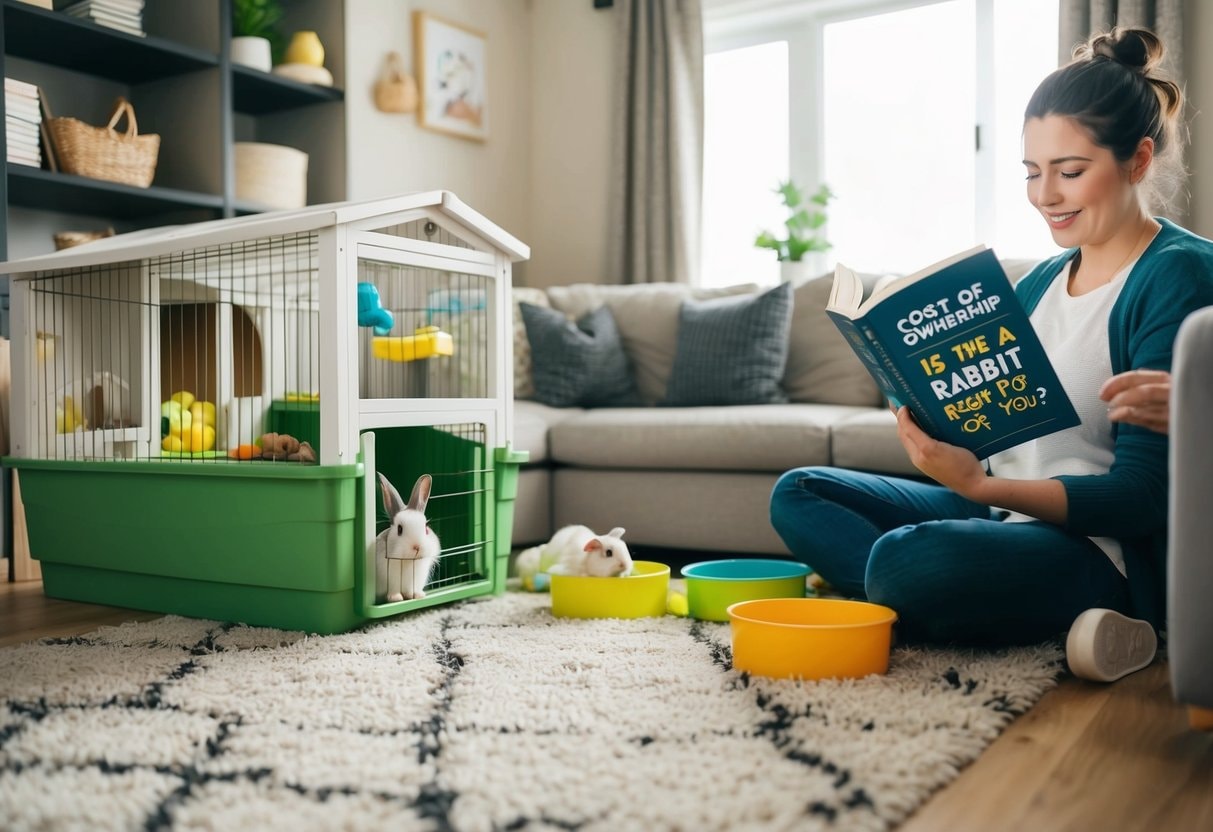
Owning a rabbit can be more expensive than you might think, leading to the question: Is a Rabbit the Right Pet for You? Before getting one, ask yourself if you can afford the ongoing costs. How much can you spend on your pet each month? Rabbits need a proper diet, toys, and supplies, costing between $35 to $80 per month. Additionally, do you have money set aside for vet bills? Rabbits need yearly check-ups and may require emergency care, which can add up to $75 or more yearly.
Assessing these financial responsibilities is crucial when considering whether a rabbit is the right fit for your lifestyle. Can you pay for the initial setup? When you first bring your rabbit home, a cage, litter box, and other items can cost $220 to $575. Are you ready for a long-term commitment? Healthy rabbits can live for over ten years, so you’ll need to budget for their care for a long time.
Have you considered adoption? Adopting a rabbit can be cheaper than buying one, often costing between $20 to $100. Remember, these are just basic costs. Special diets, grooming, or health issues could increase your expenses. Make sure you’re financially prepared before welcoming a rabbit into your home.
4. Allergies?

Are you or your family members allergic to rabbits? This is an important question when considering, “Is a Rabbit the Right Pet for You?” before bringing a bunny home. While rabbit allergies are rare, they can occur, with some people reacting to a rabbit’s fur, dander, or even their hay. If you’re unsure, spend time with a friend’s rabbit or visit a shelter to see how you feel after interacting with bunnies. Do you sneeze or get itchy eyes around rabbits? If so, you might have an allergy, but don’t worry; there are ways to manage it.
You can restrict your rabbit’s space in your home. This helps limit the spread of allergens. You could also set up rabbit-free zones in your house. Washing your hands often can help, too. It stops you from touching your face with allergens on your hands. Remember, rabbits need daily care. If your allergies are severe, giving them the attention they need might be hard.
Consider These Questions:
- Can you be around rabbits without allergy symptoms?
- Are you willing to take steps to manage allergies if needed?
- Can you still provide good care if you have allergies?
Your comfort and the rabbit’s well-being are both important. Think carefully about how allergies might affect your life with a bunny.
5. Time Commitment
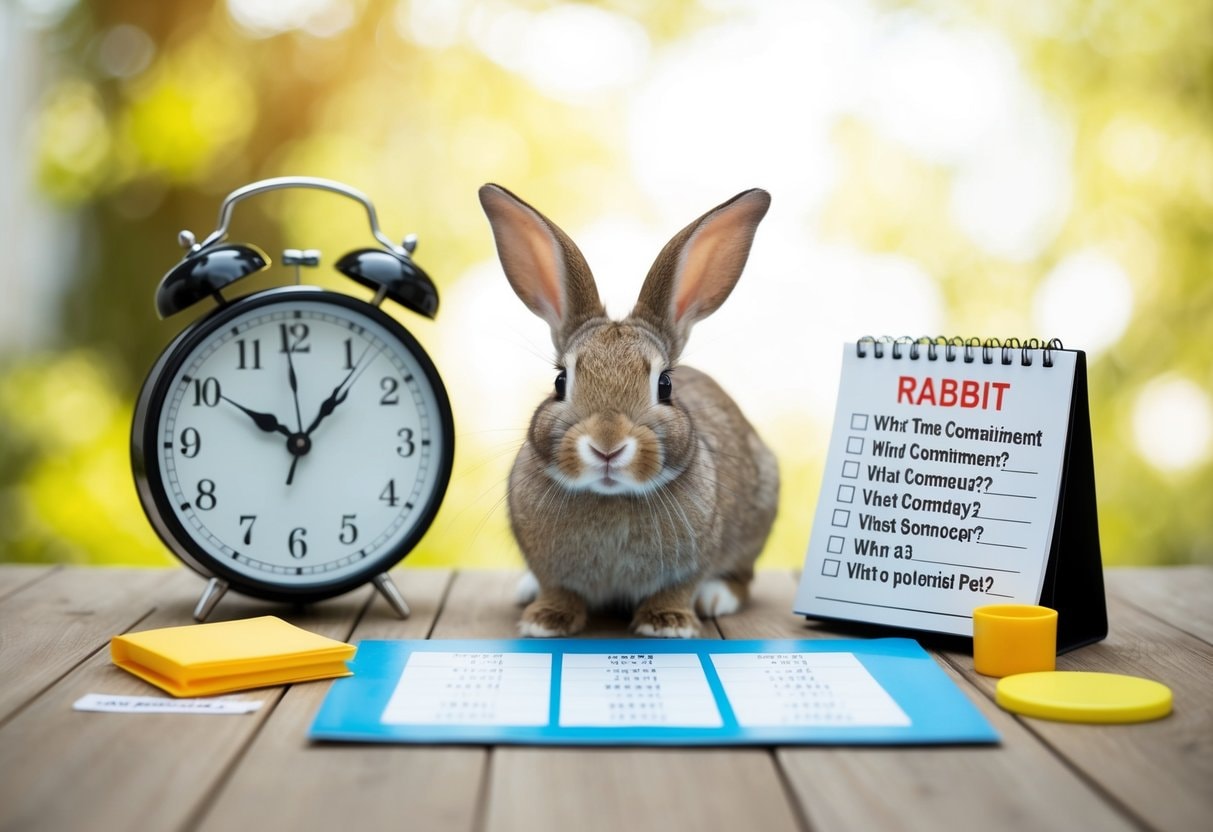
How much time can you give to a rabbit each day? Is a Rabbit the Right Pet for You? Bunnies need daily care and attention to stay happy and healthy. Rabbits require regular attention, like all pets. You’ll need to feed them, clean their living space, and spend daily time with them. Plan to spend at least an hour daily on rabbit care. This includes feeding, cleaning, and playtime outside their enclosure.
Rabbits enjoy social interaction. Can you give your bunny attention and playtime each day? They thrive on companionship and mental stimulation. Remember that healthy rabbits can live for more than ten years. Are you ready for a long-term commitment? Consider your schedule. Do you have time for a pet that needs daily care? If you travel often, who will look after your rabbit?
Rabbits can be trained to use a litter box and learn tricks. Are you willing to invest time in training your new pet? Think about your lifestyle. Can you make room in your routine for a furry friend who needs consistent care and attention?
Did you Know?
Rabbits need plenty of room to hop, play, and stretch out. The right housing setup keeps them safe and happy. You can keep rabbits inside or outside, but each has pros and cons. Indoor rabbits are safer from predators and bad weather. They also get more time with you. A spare room or part of your living area can work well.
Outdoor rabbits enjoy fresh air and natural light. But they need protection from extreme temperatures. A sturdy hutch or shed is a must. Make sure it’s escape-proof and predator-proof. Either way, your rabbit needs at least 3 meters of running space. This lets them hop and play freely.
6. Safe Outdoor Access
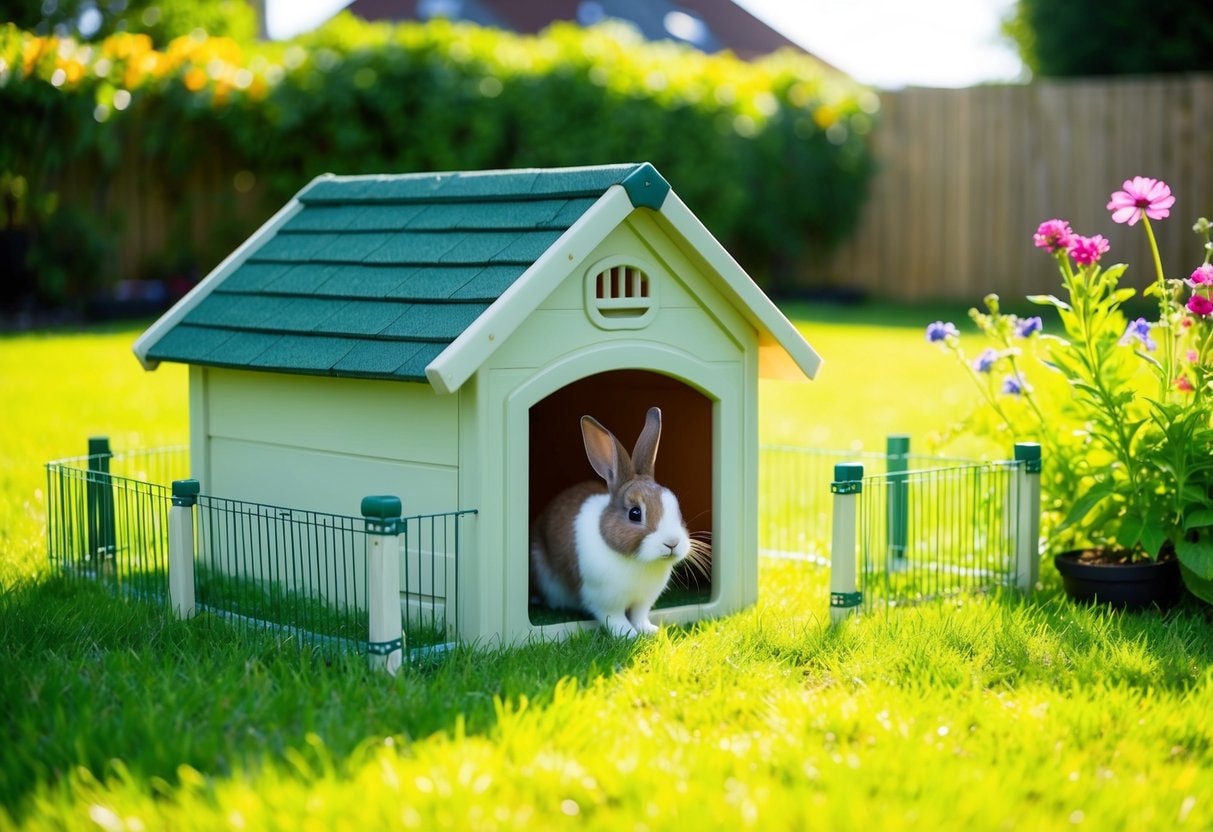
Do you have a secure outdoor space for your rabbit? Is a Rabbit the Right Pet for You? Bunnies enjoy fresh air and grass, but safety is key. A fenced yard or enclosed patio can work well. Make sure there are no gaps where your rabbit could escape. Check for toxic plants, too. Covering part of the outdoor area is smart, as this gives your bunny shade and shelter from rain. Is the space safe from predators? Cats, dogs, and even birds of prey can harm rabbits. Never leave your pet unsupervised outside.
Can you rabbit-proof the area? Remove or protect anything your bunny might chew on. Do you live in an area with extreme weather? Rabbits can get stressed by loud noises or harsh conditions. How often can you provide outdoor time? Daily access is ideal, but a few times a week is good. Remember, outdoor time is a treat. Your rabbit still needs a cozy indoor home as its main living space.
7. Availability of Fresh Vegetables

Is a Rabbit the Right Pet for You? Consider that rabbits need a diet rich in fresh veggies, which requires commitment. Can you provide these daily? Think about your grocery shopping habits and local stores—can you easily access various fresh vegetables? Rabbits enjoy different veggies like leafy greens, carrots, and bell peppers, and they need about 10% of their diet to consist of fresh produce. This means you’ll need to shop for veggies at least once a week. Are you willing to make that effort regularly?
Can you store fresh vegetables properly? You’ll need fridge space to keep the veggies crisp and fresh for your rabbit. Do you have time to wash and prepare vegetables daily? Rabbits need clean, fresh veggies to stay healthy. Are you able to introduce new vegetables slowly? This helps avoid tummy troubles for your bunny.
Can you research which vegetables are safe for rabbits? Not all veggies are good for bunnies. You’ll need to learn which ones to avoid. Are you prepared for the extra cost of buying fresh produce? Vegetables can be added to your weekly grocery bill.
8. Noise Sensitivity
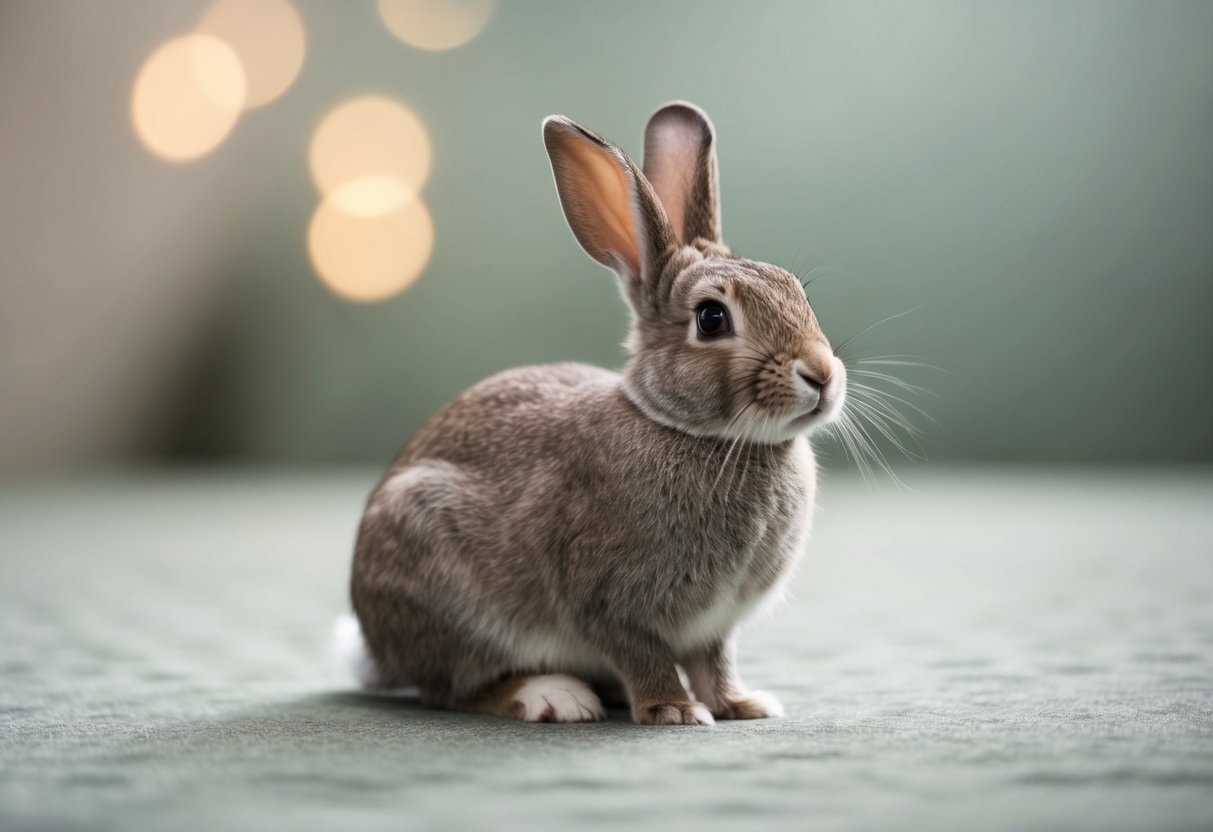
Do you live in a quiet environment? If you’re considering Is a Rabbit the Right Pet for You, it’s important to know that rabbits thrive in peaceful settings. They have sensitive hearing and can get stressed by loud noises. Are you able to maintain a calm atmosphere? Rabbits need a quiet environment to feel safe and comfortable. Sudden loud sounds can startle them easily. Do you have noisy pets or children? This might not be ideal for a rabbit. They can become anxious around constant noise and activity.
Can you provide a peaceful space for your rabbit? A quiet room or area where they can retreat is important for their well-being. Are you a light sleeper? Good news! Rabbits are generally very quiet pets. They won’t disturb your sleep with barking or meowing. Do you enjoy soft sounds? Rabbits make gentle noises like purring when content. These sweet sounds can be soothing for some owners. Can you recognize subtle noises? Rabbits communicate through various soft sounds. Learning to understand these can help you bond with your pet.
9. Gentle Handling
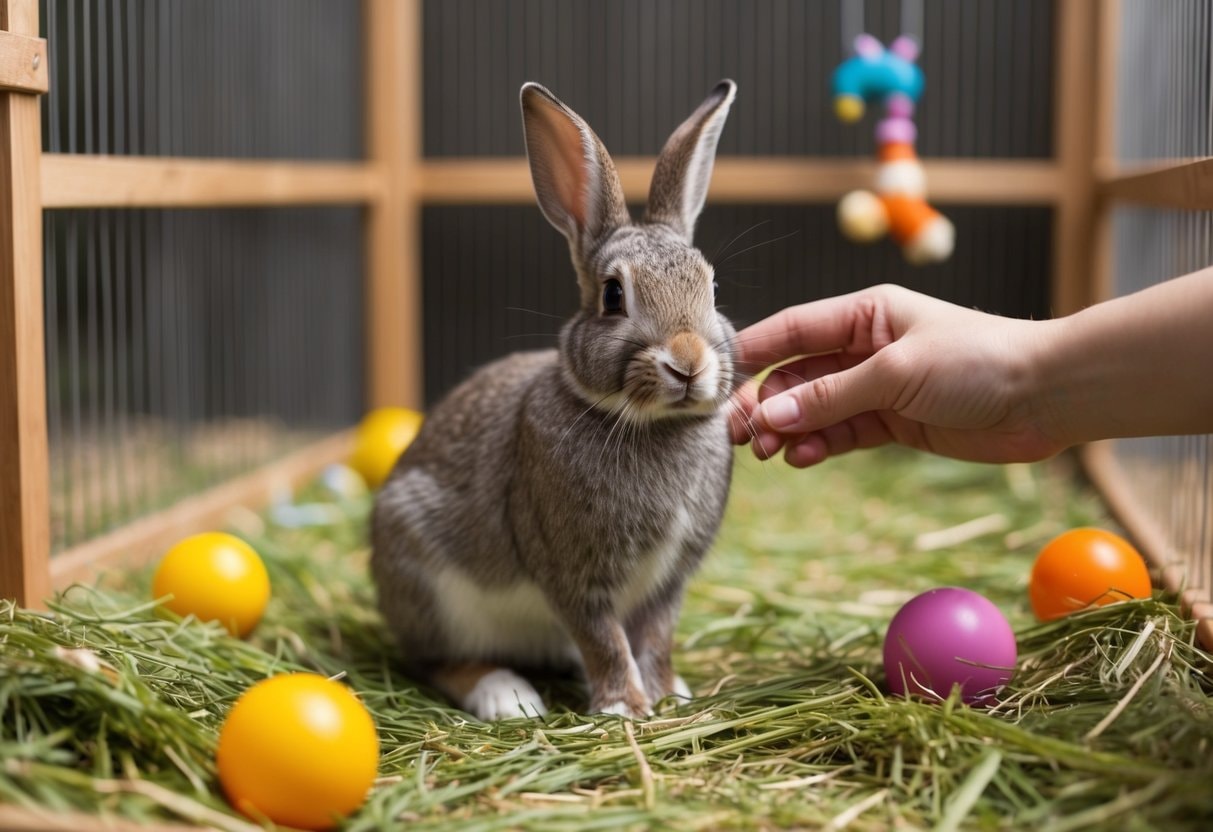
Rabbits need careful handling. They can get scared easily and may try to jump away if they feel unsafe. Is a Rabbit the Right Pet for You? Are you patient and willing to learn proper handling techniques? This is important for your rabbit’s well-being. Can you pick up a rabbit safely? You’ll need to support their body properly to avoid hurting their spine. Do you have a calm environment for your rabbit? Quiet surroundings help rabbits feel relaxed when being handled.
Are there young children in your home? Kids can sometimes be too rough without meaning to. Rabbits may bite if scared. Can you commit to regular, gentle interactions? This helps build trust between you and your bunny over time. Are you okay with going slow? It takes time for rabbits to get used to being handled. You’ll need patience. Do you have time to groom your rabbit often? Regular brushing helps with bonding and keeps their coat healthy. Remember, gentle handling keeps rabbits happy and builds a strong bond with you.
10. Vet Care Access
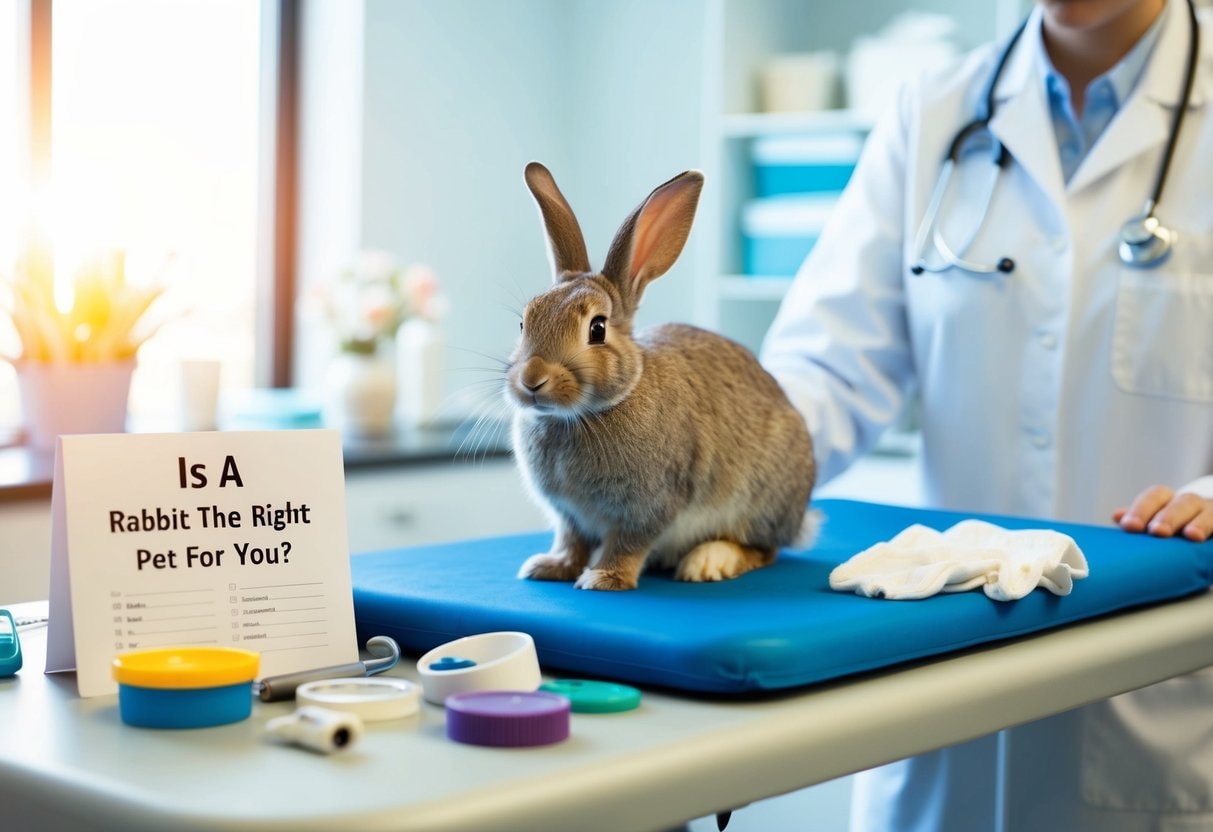
Rabbits need regular check-ups and may require specialized care. If you’re considering a rabbit as a pet, ask yourself: Is a Rabbit the Right Pet for You? Can you find a vet who knows how to treat rabbits? Not all vets are comfortable treating them, so look for an exotic pet veterinarian in your area. Ask yourself: Is there a rabbit-savvy vet nearby? How far would you need to travel for vet visits?
Additionally, consider the costs of rabbit vet care. Spaying or neutering can be pricey. Are you ready for these expenses?Regular vet check-ups are important to keep your rabbit healthy. Can you commit to yearly visits? Think about emergencies, too. Is there an after-hours vet who can treat rabbits if needed? Remember, rabbits can hide illness well. You’ll need to watch for subtle signs of sickness. Are you ready to learn about rabbit health? Finding rabbit care might be harder if you live in a rural area. Have you checked what vet options are available to you?
Did you Know?
Proper dieting your rabbit is key to keeping them healthy and happy. You’ll need to know what foods are essential and which ones to avoid. Your rabbit’s diet should be mostly hay. Timothy hay should make up about 85% of their daily food intake. It’s high in fiber and low in calcium, which is perfect for your bunny’s digestive system.
Is a Rabbit the Right Pet for You: Understanding Rabbit Behavior
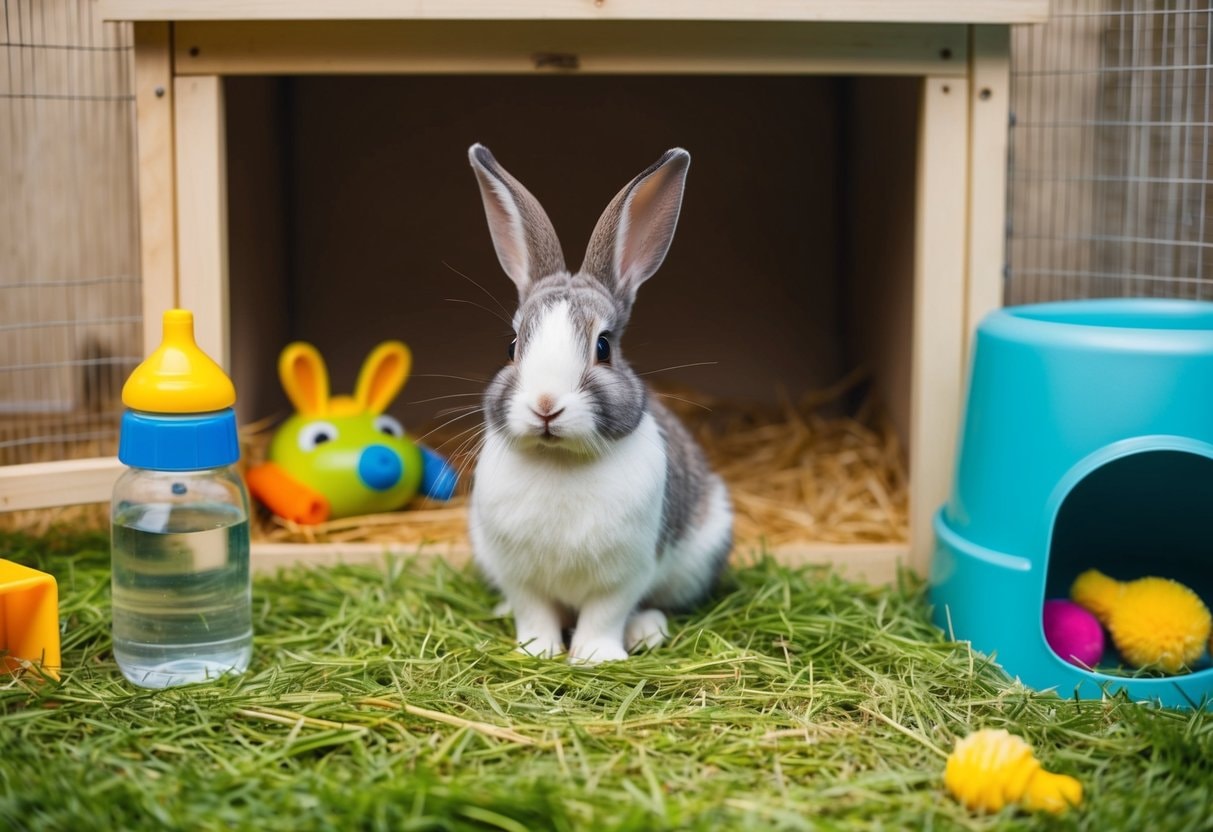
Rabbits have unique behaviors that affect their daily routines and social needs. Knowing these traits will help you decide if a rabbit is the right pet for you.
Daily Activity Levels
Rabbits are crepuscular animals, meaning they’re most active at dawn and dusk. You’ll see your bunny hopping around, exploring, and playing during these times. In the middle of the day and late at night, rabbits often rest or sleep. This pattern may require adjusting your schedule to spend quality time with your pet.
Rabbits need plenty of exercise. Give them at least 3-4 hours of out-of-cage time daily. Set up a safe play area with toys to keep them busy. Watch for the bunny flop, where they suddenly lie down and stretch out. This cute behavior means they feel safe and happy.
Social Needs
Rabbits are social creatures. They crave companionship from both humans and other rabbits. If you can’t spend much time with your bunny, consider getting two. Your rabbit will show affection through gentle head butts or by licking you. These are signs of trust and bonding. Rabbits use body language to communicate. Learn to read their signals:
- Ears Up and Forward: Alert and curious.
- Ears Flat Against the Back: Scared or angry.
- Tail Up and Wagging: Happy and excited.
Spend time on the floor with your rabbit. This helps them feel more comfortable around you. Offer treats and gentle pets to build trust.
Here’s an additional video about things to consider before getting a pet.
By: Victoria Raechel
Making the Right Choice: Is a Rabbit the Perfect Pet for You?
In conclusion, deciding if a rabbit is the right pet for you involves carefully considering various factors, from your living environment to your lifestyle and financial readiness. Rabbits can make delightful companions, offering unique personalities and affection, but they also require dedicated care, space, and time to thrive. By asking yourself the essential questions outlined in this guide—such as your ability to provide a safe and enriching environment, your commitment to regular care, and your readiness to meet their dietary and health needs—you can better understand whether a rabbit fits into your life.
Ultimately, bringing a rabbit into your home is a long-term commitment that can lead to years of joy and companionship. By ensuring you are prepared for the responsibilities of rabbit ownership, you can create a nurturing and loving environment for your future furry friend. If you can meet their needs, a rabbit may be the perfect addition to your family. Happy hopping!
Frequently Asked Questions
What Are the Pros and Cons of Having a Rabbit as a Pet?
Rabbits are cute, quiet, and can be litter box trained. They don’t need walks and can adapt to indoor living. Conversely, rabbits need lots of space to hop and play. They also chew things, so you’ll need to rabbit-proof your home. Vet care can be costly, too.
How Do You Properly Care for a Pet Rabbit?
Rabbits need fresh hay every day, along with pellets and veggies. Give them clean water and a large enclosure with toys. Brush your bunny often to prevent hairballs. Trim their nails regularly. Spend time with them daily for bonding and exercise.
What Are the Essential Things to Consider Before Adopting a Bunny?
Think about your living space – rabbits need room to run and play. Check if you have allergies to hay or rabbit fur. Consider the costs of food, housing, and vet care. Rabbits can live 10+ years, so it’s a long-term commitment.
Engage with Us and Join the Fun on Social Media!
Are you fond of your bunny? So are we at The Rabbit Hop!
Check out our online presence for:
- Bunny Joy: Enjoy delightful videos, uncover intriguing facts, and receive advice on keeping your bunny content!
- Product Insights: Find the best items for your fluffy companion.
- Bunny Network: Connect and share experiences with other bunny lovers just like you.
Follow us on:
Let’s work together to make your bunny the happiest in the neighborhood!



